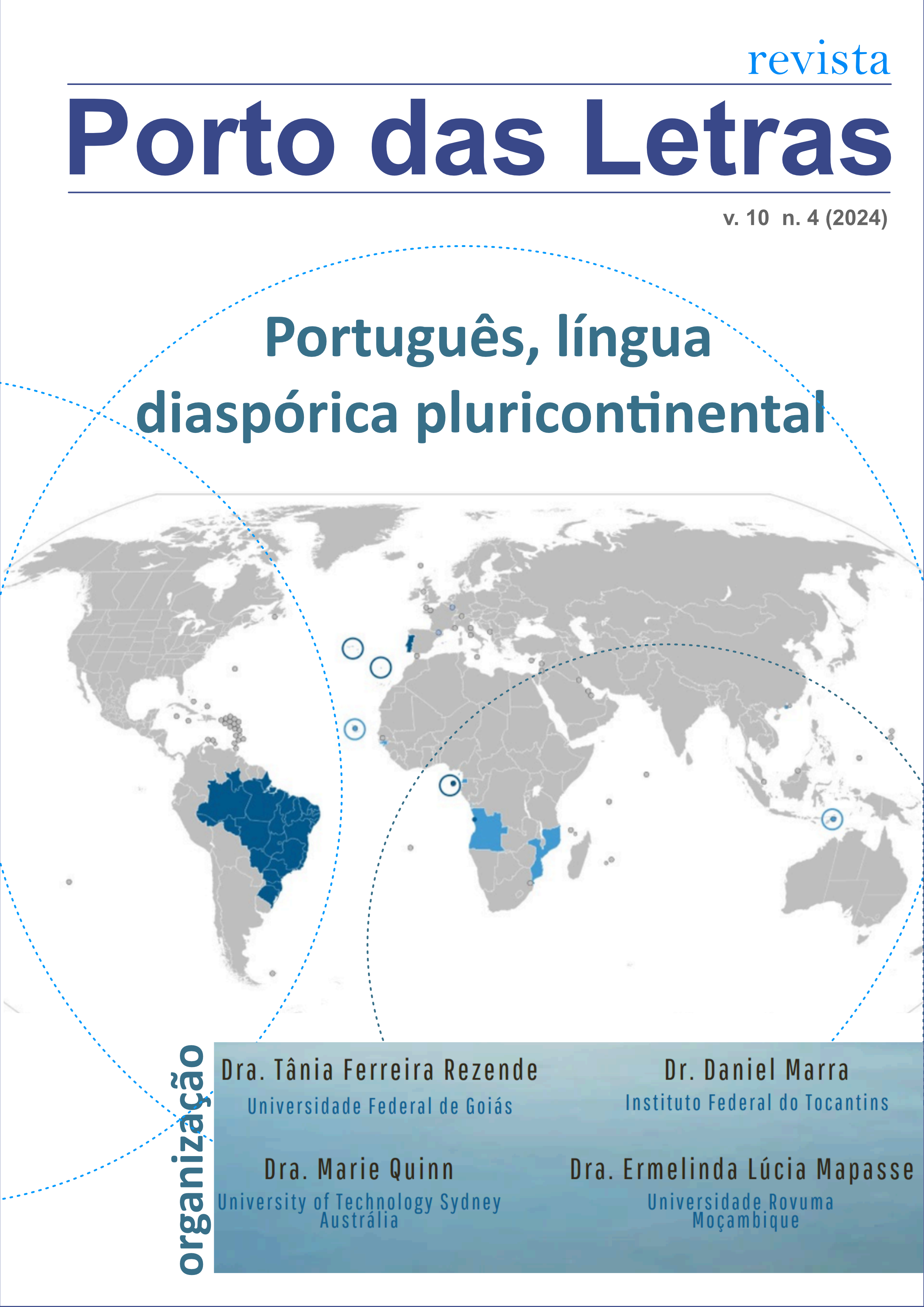ESCOLHAS LEXICAIS NA COMPOSIÇÃO DA OBRA RIO TURUNA, DE ELI BRASILIENSE
DOI:
https://doi.org/10.20873.24.3014Resumo
Este artigo analisa unidades lexicais e expressões lexicalizadas identificadas na obra Rio Turuna (1964), de Eli Brasiliense, que recobrem os sentidos da palavra “Turuna”, de modo a evidenciar a forma como o autor compõe sua narrativa por meio de uma criteriosa seleção lexical que busca dar conta dos entornos significativos que envolvem o ambiente físico e as personagens da obra. Além disso, mostra como a metáfora e a metonímia são abundantes e operantes no processo de criação lexical, evidenciando como os sentidos dos vocábulos sob análise foram criados e se estabeleceram por meio de processos metafóricos e como o uso dessas unidades lexicais contribuem para a finalidade da composição literária, do estilo e do conceito apresentados no livro. Realça, finalmente, que tanto a criação de um item lexical, as novas formações (neologismos) e expressões idiomáticas, quanto suas variações de sentido envolvem objetivos pragmáticos, como a necessidade de expressão de novos sentidos relacionadas a realidades identificadas no mundo empírico.
Referências
ALMEIDA, N. A. de. Presença literária de Eli Brasiliense. Goiânia: UCG, 1985.
BIDERMAN, M. T. C. A estruturação mental do léxico. São Paulo: Queiroz/EDUSP, 1981.
BIDERMAN, M. T. C. Teoria linguística: teoria lexical e linguística computacional. Rio de Janeiro: Livros Técnicos e Científicos, 1978.
BRAIT, B. A construção do sentido: um exemplo fotográfico persuasivo. Língua e Literatura, n. 21, p. 19-27, 1994/1995.
BRASILIENSE, E. Rio Turuna. Goiânia: UFG, 1964.
CASCUDO, L. da C. Dicionário do folclore brasileiro. São Paulo: Universidade de São Paulo, 1999.
COSERIU, E. Linguistic competence: what is it really? The Modern Language Review, n.80, v.4, p.xxv-xxxv, 1985.
DUBOIS, J. et al. Dicionário de Linguística. São Paulo: Cultrix, 2004.
FERREIRA, A. B. O. Novo Dicionário Aurélio da Língua Portuguesa. Curitiba: Positivo, 2004.
FIORIN, J. L. Figuras de retórica. São Paulo: Contexto, 2014.
FLORES, K. M. Caminhos que andam: o rio Tocantins e a navegação fluvial nos sertões do Brasil. Goiânia: Universidade Católica de Goiás, 2009.
HOUAISS, A.; DE SALLES VILLAR, M.; DE MELLO FRANCO, F. M. Dicionário Houaiss da língua portuguesa. Rio de Janeiro: Objetiva, 2003.
ISQUERDO, A. N. Normas lexicais no português do Brasil e desafios para a lexicografia brasileira. In: MAGALHÃES, J. S.; TRAVAGLIA, L. C. (org.). Múltiplas perspectivas em Linguística. Uberlândia: EDUFU, 2008. p. 447-458.
JAKOBSON, Roman. Essais de linguistique générale (1963). Cité à la, v. 9, 1963.
LABOV, W. Estágios na aquisição do inglês standard. In: FONSECA, M. S., V.; NEVES, M. F. (org.). Sociolinguística. Rio de Janeiro: Eldorado, 1974. p. 49-86.
LAKOFF, G.; JOHNSON, M. Metaphors we live by. Londres: University of Chicago Press, 1980.
MARRA, D. Os níveis da linguagem: a teoria linguística de Eugenio Coseriu. ALFA: Revista de Linguística, São Paulo, v. 67, 2023. Disponível em: https://periodicos.fclar.unesp.br/alfa/article/view/16674. Acesso em: 31 mar. 2024.
MARRA, Daniel. Cerrado e Veredas: designação, sentido e mudança semântica. Linha D’Água, [S. l.], v. 33, n. 1, p. 105–127, 2020. Disponível em: https://www.revistas.usp.br/linhadagua/article/view/163404. Acesso em: 27 mar. 2024.
MARRA, D.; MILANI, S. E. Reflexões acerca do conceito de língua como uma instituição social em William Dwight Whitney. Cadernos do IL, [S. l.], n. 46, p. 129–147, 2013. Disponível em: https://seer.ufrgs.br/index.php/cadernosdoil/article/view/35837. Acesso: 27 mar. 2024.
ORTÊNCIO, W. B. Dicionário do Brasil Central: subsídios à filologia: linguagem, usos e costumes, folclore, toponímia dos municípios goianos. São Paulo: Ática, 1983.
POHL, João Emanuel. Viagem no interior do Brasil empreendida nos anos de 1817 a 1821. Instituto Nacional do Livro, 1951.
POVOA, J. L. Dicionário tocantinense de termos e expressões afins. Edição do Autor, 2002.
SAUSSURE, F. Curso de linguística geral. São Paulo: Cultrix, 1974.
SILVA, A. S. da. O mundo dos sentidos em português. Polissemia, semântica e cognição. Coimbra: Almedina, 2006.
VILLALVA, A.; SILVESTRE, J. P. Introdução ao estudo do léxico. Descrição e análise do português. Petrópolis: Vozes, 2014.
Downloads
Publicado
Como Citar
Edição
Seção
Licença
Os autores concordam com os termos da Declaração de Direito Autoral, que se aplicará a esta submissão caso seja publicada nesta revista (comentários ao editor podem ser incluídos a seguir).

